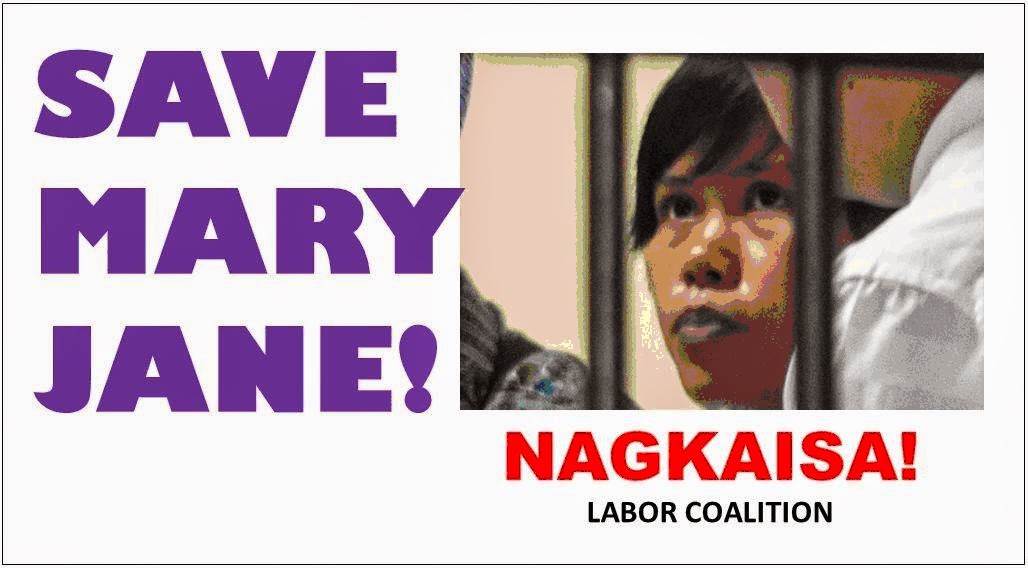NEWS RELEASE
NAGKAISA!
27 April 2015
President Aquino has failed the workers during the last five years
and nothing more can be expected from the remaining 14 months in office for
this administration. For this reason, Nagkaisa, the country’s largest
coalition of trade union federations and labor organizations, is terminating
its regular dialogue with the President being done every Labor Day since 2012.
“No more breakfast or luncheon meeting with the President this
coming May 1. The last three years of engagement satisfied the form but
produced no substance,” declared Nagkaisa in a press conference
held Monday in Manila.
On Labor Day the group will rather concentrate all its forces for
the big March to Malacanang to seek justice for the 40 million workers whose
fight for jobs and job security, living wage, trade union rights and decent
working and living conditions remain unheeded. A cry for justice, which
they say, will extend until the next regimes.
Women leaders who composed Nagkaisa’s main panel for the press
conference shared the group’s general assessment of the Aquino administration
that was held the other day and declared “walang naituwid at walang naitawid” during PNoy’s five
years in office.
Open doors
but close minds
Nagkaisa said that since 2012, the group has sincerely pursued
dialogues with the Palace, hoping that issues brought directly to the President
might speed up the resolution of age-old problems besetting labor.
“We have proven otherwise that while the Palace doors are open for
dialogue, the people in power inside maintains a close mind with regard to
proposed changes on policies being pursued by labor,” explained the group.
These include Nagkaisa’s demand for the President to certify as
urgent the Security of Tenure bill to address the plague of contractualization
that destroys job security and union rights.
The Palace played deaf on this demand while maintaining a ‘kid
gloves’ policy in dealing with big companies as well as the proliferation of
manpower agencies and cooperatives involved in outsourcing and labor-only
contracting activities.
Starvation
wages
The government has also failed to raise workers’ wages from the
barest minimum despite record growth in the economy.
“The combined wealth of the country’s richest businessmen has
grown by ten-fold yet workers’ wages remained at starvation levels,” said
Nagkaisa.
The real value of the NCR minimum wage of P466 is P354 only while
a family of five need more than a thousand pesos living wage to enjoy a decent
life.
Nagkaisa likewise demanded a reduction in power rates with
concrete proposals on how to do it. But Malacanang stood powerless in the
face of private power. Had the Supreme Court not issued a TRO for the P4/kWh
spike in prices last year, the Philippines
could have stolen the record of having the highest electricity rates in the
world.
City lands
for developers
The Aquino government has adopted a program for socialized
housing that entertains housing projects through a “people’s proposal”.
But Nagkaisa said the program is very selective and limited while most of city
lands were appropriated not for socialized housing but for the real estate
business of giant land developers.
Urban development are not for the urban poor but virtually a fight
between the Ayalas, Henry Sy, Lucio Tan, Gokongwei, Andrew Tan, Consunji,
George Ty and Manny Villar.
Mary Jane
According to Nagkaisa, the sad fate of Mary Jane Veloso represents
an individual tragedy resulting from the country’s chronic unemployment
problem.
“Her story is an added statistics to the long list of OFWs who
braved the challenges of foreign lands in search for jobs but suffered tragic
ends either from the cruel hands of employers or from the treacherous hands of
organized syndicates or get caught in between wars of conflict,” said Nagkaisa.
There is no dramatic change in the unemployment rate under PNoy, said Nagkaisa. In fact, the
unemployment rate of 7.5% in 2014 is higher than the unemployment rates of 5.2%
in 1976, 6.7% in 1986, and 7.3% when PNoy assumed office in 2010.
Unemployment is also highest among youth (52% in SWS survey) while
participation rate of women in the labor force remained flat for half of its
population of 15 years and above.
Poor state,
high prices of goods and services
Besides problems of unemployment and precarious working
conditions, the poor state and high prices of basic goods and services such as
power and water, transportation, healthcare and education weigh heavily on the
lives of millions of workers.
And in the face of this generalized condition of the toiling
masses, Nagkaisa said the only thing the Aquino administration can do for the
workers is to mobilize its powers in organizing nationwide job fairs on Labor
Day.










